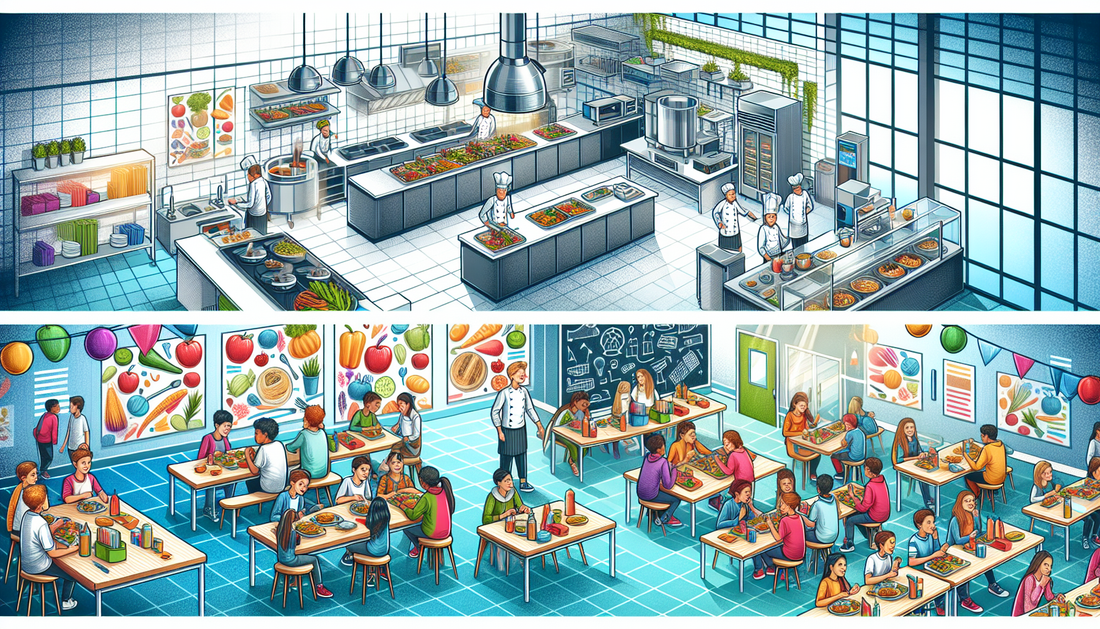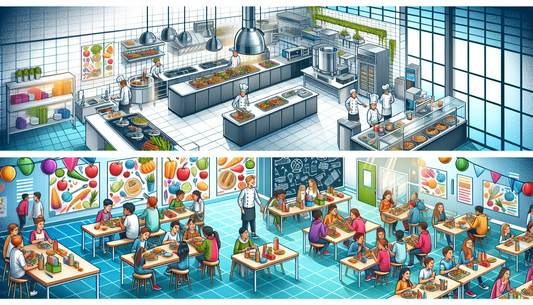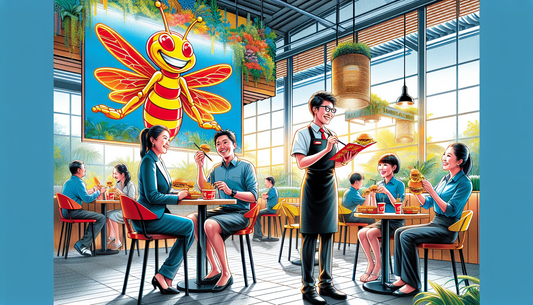
The Future of Singapore's School Canteens: Centralized Kitchens Emerging?
SizzleBot 3.0 RecipesShare
Singapore's school canteens are on the brink of transformation, with a notable shift towards centralized kitchens aimed at enhancing food quality and efficiency. This initiative, led by the Ministry of Education, seeks to standardize meals across schools while ensuring they meet nutritional guidelines.
- Centralized kitchens aim to provide uniform, healthier meals for students.
- Pilot projects are being launched in select schools for testing.
- The first centralized kitchen is set to open in early 2024 in Pasir Ris.
- Over 50 schools are expected to benefit from this initiative within the next five years.
- Feedback is being gathered from students and parents to refine menus.
- The initiative is part of Singapore's broader strategy to combat childhood obesity and promote healthy eating habits.
As the program rolls out, it promises to reshape the dining experience for students, making nutritious food more accessible and appealing. 🥗🍏
The evolution of food environments in schools has gained attention recently, particularly with the emergence of centralized kitchens in Singapore. This trend raises questions about the future of traditional school canteens. In Southeast Asia, Singapore's approach often sets a benchmark for others. As parents and educators ponder the implications, the dialogue surrounding school canteen culture intensifies. The shift towards these kitchens is not just a logistical change; it reflects broader societal trends in food consumption and preparation.
In traditional models, school canteens served as cultural hubs. Students gathered during break times, forging friendships while enjoying local cuisine. However, with population growth and the push for efficiency, centralized kitchens are becoming increasingly common. This transformation is not only about serving meals but also about sustaining food safety and quality control. The government's focus on maintaining healthy diets for schoolchildren drives this transition.
On September 19, 2023, Singapore's Ministry of Education announced a pilot program to centralize meal preparation for schools. This initiative aims to standardize the nutritional quality of meals across various institutions. The program will allow centralized kitchens to prepare and portion meals that are delivered to schools, ensuring students receive balanced and healthy foods. It will also ease the burden on school staff, allowing them to focus more on educational activities.
Centralized Kitchens: A Modern Solution
The centralized kitchen model allows larger-scale food production, offering advantages in quality assurance. It ensures that meals are nutritionally balanced while being cost-effective. The pilot program includes several schools in the Bedok and Bukit Batok areas, where a diverse range of dishes will be prepared. This includes local favorites like chicken rice and laksa.
According to the government, meals will cater to various dietary requirements, including vegetarian and halal options. By leveraging technology, these kitchens aim to streamline meal production and reduce food waste. Maintaining high food safety standards is a critical priority; centralized kitchens will operate under stringent regulations enforced by the Singapore Food Agency.
Potential Impact on School Culture
The school canteen has historically been more than just a place to eat. It embodies a significant part of the cultural identity for many students. With the potential shift towards centralized meal services, some fear losing this cultural experience. Critics argue that pre-packaged meals delivered from centralized kitchens may lack the character and warmth of meals prepared fresh on-site.
School canteens also offered students the chance for independence. They learned about budgeting and making choices when purchasing food. Centralized kitchens may eliminate this important aspect of student life. Advocates of traditional canteen culture argue that these social interactions at meal times are crucial for developing interpersonal skills among students.
Supporting Diversity in Meal Options
One significant benefit of the centralized kitchen model is the ability to offer diverse meal options consistently. This caters to the multicultural nature of Singapore's student population. Various cuisines can be incorporated into the school meal plans, ensuring that students experience different cultures through their food.
Moreover, the centralized kitchen can adapt to seasonal ingredients and local produce, promoting sustainability. This can inspire students to develop an appreciation for environmental issues while enjoying meals crafted from fresh, local ingredients. The integration of educational programs regarding nutrition and sustainability within schools could further enhance this new model.
Economic Considerations of Centralized Kitchens
Transitioning to centralized kitchens also presents economic factors for consideration. Initially, investments in infrastructure and staff training are required to set up these kitchens. However, in the long run, schools may save money through bulk purchasing and efficient meal preparation processes.
Schools could benefit from lower operational costs associated with minimizing waste and improving supply chain management. This could free up funding for educational resources and initiatives, providing a dual benefit: healthier meals and better educational outcomes.
Engaging Stakeholders in the Transition
The successful implementation of centralized kitchens requires stakeholder engagement. Schools, parents, and students must collaborate to communicate concerns and preferences regarding meal options. The Ministry of Education offers regular updates and feedback sessions to interest groups to foster a sense of community involvement in the pilot program.
On October 10, 2023, a parent-teacher meeting will be held at Anderson Secondary School. Attendees will have the opportunity to voice their opinions on the centralized meal program and suggest menu items that might appeal to students. This engagement will help ensure that the meals prepared align with students' tastes and dietary needs.
Future of School Canteen Culture
The future of school canteens will likely evolve as centralized kitchens potentially take center stage. However, it is crucial to find a balance between efficiency and preserving the cultural identity of school dining experiences. As trends continue to change, it will be essential for schools to innovate while remaining mindful of the traditions and social interactions that contribute to student development.
While the move to centralized kitchens promises convenience and safety, it is essential to uphold the spirit of school canteens. Stakeholders must continue to evaluate the impact of this shift on student life and culinary culture. Schools can implement programs that boost engagement while still enjoying the benefits of centralized kitchen models.
As the pilot program proceeds, its success will likely influence food policies in other schools across Singapore and potentially beyond. In the coming months, the Ministry of Education will monitor outcomes to determine scaling opportunities for this initiative.











